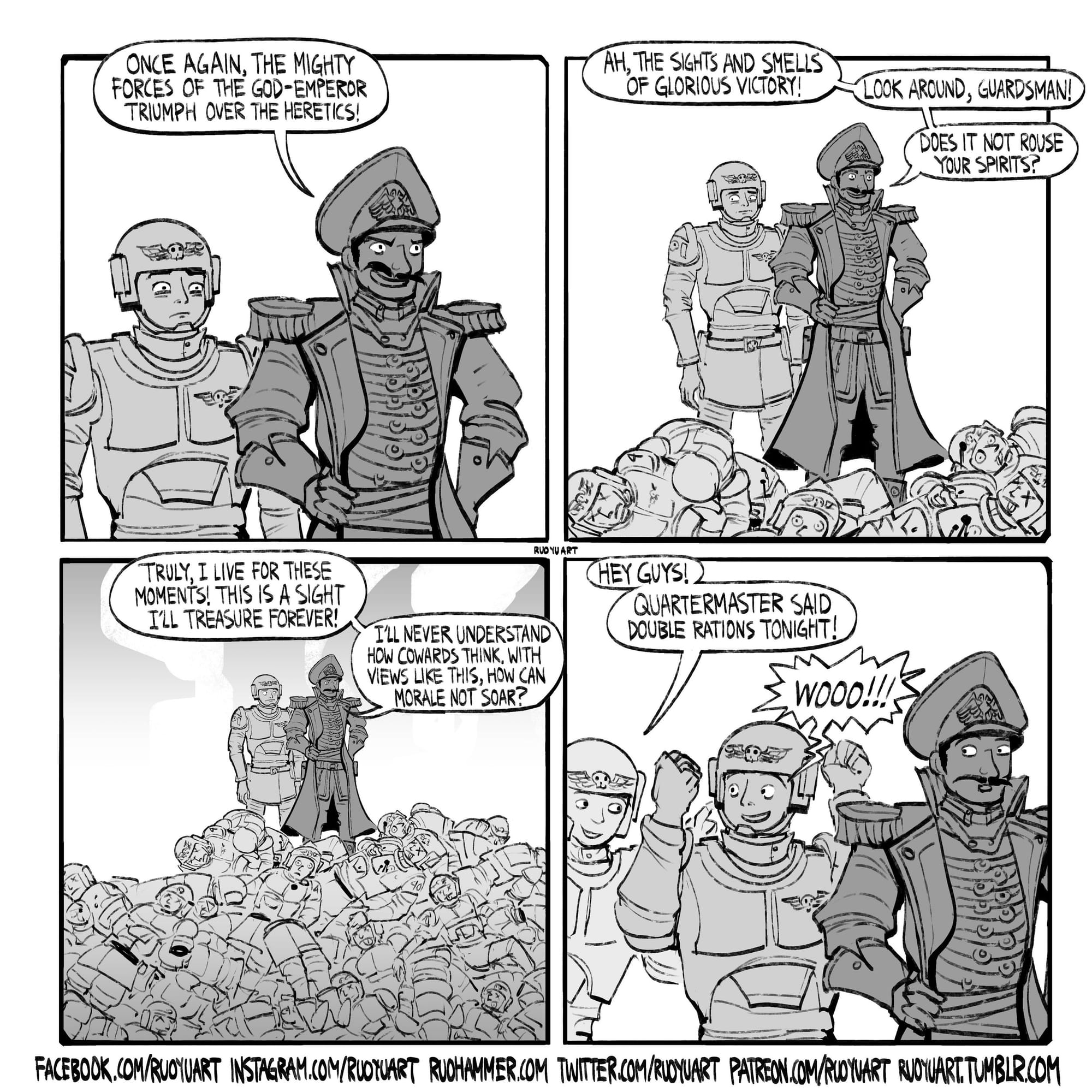Double Rations Tonight! or The AI Millionaire Machine
How to Turn a Million Workers Into Corpse-Starch and Call It Progress
"AI will create more millionaires in the next 5 years than the internet did in 20." —Jensen Huang, CEO of NVIDIA
"Hey guys! Quartermaster said double rations tonight!" —Imperial Guard trooper, standing on a mountain of his dead comrades

The Glorious Victory of Automation
LinkedIn is buzzing with excitement about the AI revolution. Digital marketing experts are copying and pasting Jensen Huang quotes about how "everyone is now an artist, everyone is an author, everyone is a programmer." The future is bright! The opportunities are endless! AI is the great equalizer!
Meanwhile, copywriters are being replaced by ChatGPT. Graphic designers are competing with Midjourney. Programmers are watching GitHub Copilot write code faster than they can think. But don't worry—they can all become "prompt engineers" now. That's progress, right?
This reminds me of a Warhammer 40,000 comic where Imperial Guard officers stand atop a literal mountain of corpses, celebrating their "glorious victory" and wondering why morale isn't higher among the surviving troops. When the quartermaster announces double rations, the soldiers cheer—not realizing they're about to eat their fallen comrades processed into corpse-starch.
The Ration Distribution Problem
Here's the uncomfortable math that Jensen Huang's cheerleaders don't want to discuss:
For every AI millionaire created, how many workers get ground into economic paste?
The answer is hiding in plain sight. When NVIDIA's stock price goes up by billions, when OpenAI gets valued at $157 billion, when tech executives buy their third yacht—where exactly does that value come from?
It comes from labor displacement efficiency. Every job that AI can do cheaper, faster, and without benefits is money that flows upward to shareholders and downward to... well, nobody. The displaced workers don't get a share of the productivity gains. They get "opportunities" to "upskill" themselves into gig work.
Everyone Is Now a Programmer (Making $15/Hour)
"Everyone is now an artist. Everyone is an author. Everyone is a programmer."
This is the most insidious lie in the AI hype cycle. Yes, AI tools have democratized certain capabilities. But democratization and monetization are two very different things.
When "everyone" can write code with AI assistance, the value of writing code approaches zero. When "everyone" can create art with Midjourney, the value of creating art collapses. When "everyone" can produce content with ChatGPT, we get an ocean of algorithmic slop competing for the same shrinking pool of attention.
The result isn't a million new millionaires. It's a million people competing to be the cheapest provider of increasingly commoditized services. Race to the bottom, but with better UX.
The Corpse-Starch Supply Chain
The AI economy operates like the Imperium of Man's food distribution system:
Raw Materials: Human creativity, expertise, relationships, cultural knowledge Industrial Processing: Algorithmic extraction and optimization
Primary Output: A few AI millionaires + platform shareholder value Secondary Output: Gig work opportunities for the survivors Waste Products: Displaced communities, broken industries, cultural homogenization
The beautiful part is that the processed humans don't even realize they're being eaten. They think they're "leveraging AI tools" and "building their personal brand." They're grateful for the double rations.
The Sights and Smells of Glorious Victory
LinkedIn influencers post daily about the amazing opportunities in the AI space. They share screenshots of their AI-generated content going viral. They celebrate their "AI-augmented productivity." They're standing on the mountain of corpses, breathing deeply, and asking why everyone isn't as excited as they are.
The smell they're enjoying is the economic decomposition of entire professional classes. The sight that fills them with pride is the efficient conversion of human expertise into training data. But hey—engagement is up!
The Morale Problem
"I'll never understand how cowards think. With views like this, how can morale not soar?"
This is every AI evangelist wondering why workers aren't more excited about automation. Why aren't writers thrilled that ChatGPT can replace them? Why aren't artists celebrating the democratization of their craft? Why do graphic designers seem so negative about the future?
Because they can smell the corpse-starch, even if they can't see the mountain of bodies yet.
The Great Redistribution
The internet boom created millionaires by expanding markets and creating new industries. The AI boom is creating millionaires by contracting labor costs and eliminating human inefficiencies.
It's not wealth creation—it's wealth redistribution from the many to the few, mediated by algorithms that make the process look like natural market forces instead of systematic extraction.
The "double rations" are just a larger share of a shrinking pie, made from the economic remains of your former colleagues.
The Only Game in Town
The tragedy is that there's no alternative. If you want to work in media, you need to compete with AI content. If you want to program, you need to use AI tools. If you want to create anything, you have to participate in the economy that's systematically devaluing human creativity.
It's like being conscripted into the Imperial Guard and then being told you should be grateful for the opportunity to serve the Emperor—even as you watch your squad mates get turned into tonight's dinner.
The Taste of Victory
So raise your cups of corpse-starch protein shake and toast the AI revolution! Jensen Huang says we're all going to be millionaires! Everyone's a programmer now! The future is democratized!
Just try not to think too hard about where the extra rations are coming from.
And if you start to feel a little sick to your stomach, well—that's just disruption. You'll develop a taste for it.
"WOOO! Double rations!"
For the Emperor! And shareholder value!
The golden throne runs on human sacrifice. The AI economy runs on human data. Same energy. Better PR.